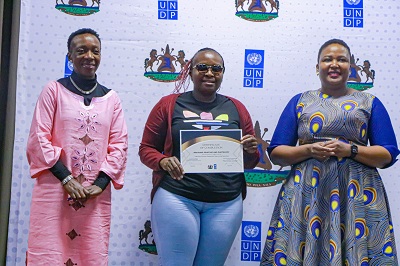By: Mpho Shelile
Maseru – The United Nations Development Programme (UNDP) together with the Minister of Information, Communication, Science, Technology and Innovation (MICSTI) recently launch an innovative E-Services Outlet Model aimed at empowering micro, small, and medium enterprises (MSMEs) to offer digital services within their communities, awarding them with certificates for completing their training.
This initiative provides 33 MSMEs with the tools and support needed to establish these e-service outlets, thus enhancing their ability to deliver crucial digital services to the hard-to-reach areas in Lesotho.
This model is part of UNDP’s broader strategy to accelerate digital transformation and improve access to public services through digital means. The program is expected to not only boost the local economy by supporting small businesses, but also to increase community access to essential digital services such as government transactions, digital payments, and information services.
In his opening remarks, Lerotholi Ramashamole, Principal Secretary of the Minister of Information, Communication, Science, Technology and Innovation (MICSTI), emphasizes that the government is wholeheartedly committed to practicing inclusivity and ensuring that no one is left behind. As a result, they have collaborated with UNDP and other stakeholders to guarantee that every Mosotho has digital access.
When addressing the 33 outlets, he says they should work hard to offer their services to the communities they live in. He adds that there are many opportunities coming their way and that they can learn a lot from one another and from the private sector. Ramashamole gives an example of Mpesa and Eco-cash agents, stating that they all started with one or two clients a day but now have hundreds of clients a day.
During his presentation on the E-Services Outlet experiment, Teboho Khoali, the Accelerator Lab Head of Experimentation, highlights the most critical challenge regarding digital services in Lesotho’s education.
He mentions that not all students have access to gadgets. According to our mixed 2021 report, only 18% of high school level students are participating in technology, while the percentage drops to 7% at the secondary level. When we look at the tertiary level, only 21% of students are using technology, and out of those, only 10% are in total use of it.
UNDP Resident Representative Dr. Jacqueline Olweya points out that internet adoption in Africa is on the rise. She notes that in Southern Africa, internet adoption is growing at 75.9%, the highest in Africa. Dr. Jacqueline also mentions that despite the lack of traditional jobs, the youth in Kenya are leveraging the internet to create online employment opportunities. Additionally, she highlights that 47% of the population in Lesotho now has access to the internet, showing a slight increase from previous years.
Dr. Jacqueline emphasizes the significance of E-service outlets, as they will improve accessibility for everyone, regardless of gender, location, or financial resources. She concludes by expressing gratitude to MICSTI for creating the platform and to the partners for their collaborative efforts.
Hon. Nthati Moorosi emphasizes that the government is committed to ensuring that nobody is left behind in the digital era. She explains that their mission is to provide access to government services for every Mosotho, including those in remote areas of the country. Additionally, Hon. Moorosi mentions that they plan to establish at least 40 schools and 10 postal services as e-Service Centers to ensure widespread access. “As the Government of Lesotho, we have aggressively embarked on the digitalization project,” Hon. Moorosi says.
Additionally, the minister outlines poor infrastructure and security as some of the major challenges confronting them in this initiative. She mentions that the MICSTI is busy mapping for migration from manual to digital for all other ministries as a way to cut costs and unnecessary procedures. As she concludes her remarks, Hon. Moorosi expresses her heartfelt gratitude for a harmonious partnership with the UNDP, the Ministry of Trade, and other independent partners.”
Ben Mosia, representing the other E-Services Outlets, expresses his deep appreciation to the ministry and UNDP for providing them with the opportunity to collaborate. He emphasizes the significance of the partnership and conveyed their enthusiasm to contribute to the shared goals and initiatives.
UNDP and the government aim to create sustainable digital ecosystems that can drive long-term economic growth and enhance service delivery at the grassroots level. This approach aligns with their commitment to inclusive digital transformation, ensuring that even the most remote and underserved communities can benefit from the advancements in digital technology.


